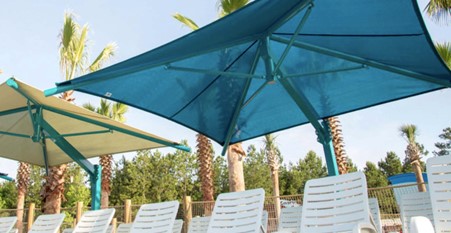Shade constructions are essential for creating comfortable outdoor spaces, offering protection from the sun’s rays. When selecting materials for shade structures, factors such as durability, aesthetics, cost, and maintenance requirements need to be considered. In this blog, we will explore and contrast the top materials used for shade constructions and shade sail installation UAE, including fabric, metal, and wood.
Understanding the unique characteristics and benefits of each material will help you make an informed decision when planning your shade construction project. Structural fabrication companies in UAE are renowned for their expertise in designing and constructing high-quality steel and metal structures, ranging from industrial warehouses to iconic skyscrapers.
- Fabric:
Fabric is a popular choice for shade constructions due to its versatility and cost-effectiveness. It offers various options in terms of colors, patterns, and textures, allowing for customization to match the surrounding environment or desired aesthetic. Fabric shades are lightweight and easy to install, making them ideal for temporary structures or areas where mobility is required.
One of the key advantages of fabric is its ability to provide UV protection. High-quality fabrics can effectively block harmful UV rays, reducing the risk of sunburn and long-term skin damage. Additionally, fabric shades offer excellent breathability, allowing air to pass through while providing shade. This feature makes them suitable for hot climates, as they can help to maintain a cooler and more comfortable environment.
However, fabric shades may have some limitations. While they are durable, exposure to harsh weather conditions over an extended period can cause fading, deterioration, or tearing. Regular maintenance, such as cleaning and applying protective coatings, is necessary to prolong their lifespan. Fabric shades also require periodic replacement compared to more durable materials like metal or wood.
- Metal:
Metal is a sturdy and long-lasting material choice for shade constructions. Common metals used include aluminum, steel, and wrought iron. Metal shades offer excellent structural integrity, making them ideal for permanent or large-scale shade structures such as pergolas or pavilions.
One of the primary advantages of metal shades is their durability. They are highly resistant to weather elements such as rain, wind, and intense sunlight. Metal structures also require minimal maintenance, as they are less prone to fading, warping, or rotting. With proper coatings and finishes, they can withstand corrosion, adding to their longevity.
Metal shades provide a modern and sleek appearance, making them suitable for contemporary outdoor designs. However, their industrial look may not be as visually appealing in certain settings, such as natural or traditional environments. Metal structures also tend to conduct heat, which can make the shaded area warmer during hot weather.
- Wood:
Wood is a classic and versatile material choice for shade constructions, known for its natural beauty and warmth. Common types of wood used include cedar, redwood, and treated lumber. Wood shades blend seamlessly with outdoor surroundings, making them popular for rustic, traditional, or organic design styles.
One of the key advantages of wood shades is their aesthetic appeal. Wood offers a wide range of color variations and grain patterns, providing a natural and inviting ambiance to outdoor spaces. It can be stained, painted, or left untreated to age gracefully and develop a distinct patina over time.
Wood shades also offer excellent insulation properties, providing a cooler environment by reducing heat transfer. However, wood requires regular maintenance to preserve its integrity. Periodic sealing, staining, or painting is necessary to protect against moisture, rot, and insect infestation. Without proper care, wood shades can deteriorate and become susceptible to warping or splitting.
Conclusion:
Choosing the right material for your shade construction project depends on various factors, including durability, aesthetics, cost, and maintenance requirements. Fabric shades offer versatility and cost-effectiveness, while metal shades provide durability and structural integrity. Wood shades, on the other hand, offer natural beauty and insulation properties.
By understanding the unique characteristics and benefits of fabric, metal, and wood, you can make an informed decision that best suits your specific needs and preferences. With state-of-the-art facilities and a skilled workforce, structural fabrication companies in UAE excel in delivering custom-made solutions that meet the stringent safety and quality standards of the construction industry.
